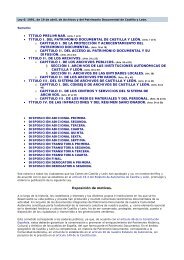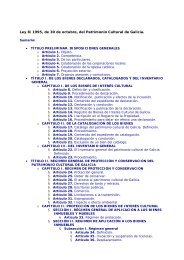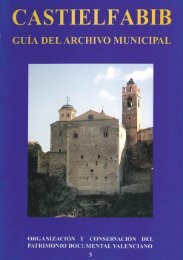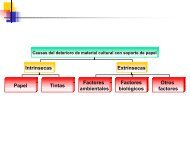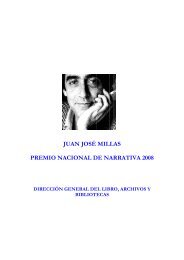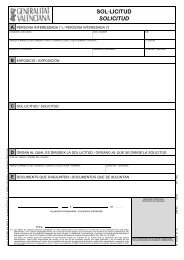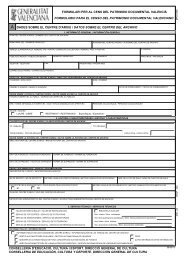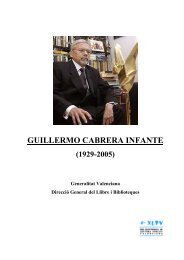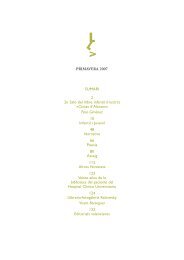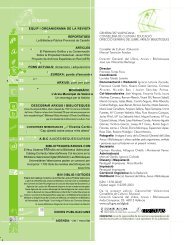Listening to the Past, Speaking to the Future
Listening to the Past, Speaking to the Future
Listening to the Past, Speaking to the Future
- No tags were found...
You also want an ePaper? Increase the reach of your titles
YUMPU automatically turns print PDFs into web optimized ePapers that Google loves.
50 The Task Force is confident that creating <strong>the</strong> ArchivesGateway will be an important step <strong>to</strong>wards addressing<strong>the</strong>se issues by raising awareness and expectations amongarchive workers and users, and by demonstrating <strong>the</strong>demand for archive services <strong>to</strong> funders. The searchresources of <strong>the</strong> Archives Gateway will help <strong>to</strong> encouragegreater accessibility as new connections and opportunitiesare revealed.• users can access catalogue entries, digitised images,contextual information and individual learning pathsthrough <strong>the</strong> Archives Gateway;• onsite public services meet <strong>the</strong> expectations of 21stcentury users and complement user-focused technologicaldevelopments;• a properly skilled workforce is in place <strong>to</strong> provide <strong>the</strong>content for <strong>the</strong> Archives Gateway and services and provideonsite and outreach services;• collections are appropriately preserved and conserved sothat users now and in <strong>the</strong> future can understand <strong>the</strong>ir ownhis<strong>to</strong>ry and identity.1234Modernisation is <strong>the</strong> key <strong>to</strong> creating <strong>the</strong> capacity that willbe needed <strong>to</strong> ensure that:The Task Force’s seventh recommendation <strong>the</strong>reforeproposes a programme of work that will address <strong>the</strong> mostsignificant concerns. Building on work by national archiveinstitutions and agencies, archive agencies in <strong>the</strong> homenations and in England, Regional Agencies for museums,libraries and archives and Regional Archive Councils, weare confident that this will lay <strong>the</strong> foundations for longtermimprovement and transformation within all archives.Four action lines have been identified that should form <strong>the</strong>basis of a modernisation programme over <strong>the</strong> next threeyears:Creation of Centres of Expertise <strong>to</strong> share skills and advice;Quality assurance and continuous improvementin stewardship;Encouraging volunteering;Developing <strong>the</strong> UK archives and records managementworkforce.Centres of ExpertiseMLA is already involved in reviewing <strong>the</strong> need forprofessional advisory services both nationally acrossEngland and within <strong>the</strong> nine English regions. Workingthrough national institutions, <strong>the</strong> Regional Agencies formuseums, libraries and archives and <strong>the</strong> RegionalMuseum Hubs, options are being considered for advisoryservices <strong>to</strong> support professional needs. However, it isalready apparent that centres of excellence and expertisecan help significantly <strong>to</strong> reduce disparities between <strong>the</strong>largest and <strong>the</strong> smallest institutions, <strong>the</strong> publicly fundedand <strong>the</strong> voluntary and <strong>the</strong> lack of technical skills that existin many places. Centres of Expertise can operate ondifferent levels. While most of <strong>the</strong> Task Force’s debate hasbeen about a regional focus, it is evident that <strong>the</strong>re ispotential for <strong>the</strong> larger, publicly-funded services <strong>to</strong> fosterand support <strong>the</strong>ir smaller, private and voluntaryneighbours, and informally many already do.The Task Force endorses this approach and proposesthat fur<strong>the</strong>r research is undertaken <strong>to</strong> establish <strong>the</strong>mechanisms and funding models that would need <strong>to</strong> beput in place for such Centres of Expertise <strong>to</strong> be effective.It has identified a range of roles that might be fulfilledat a different scale of operation:• Conservation: a minority of archives are now able <strong>to</strong>sustain in-house conservation facilities. There is alsoa skills shortage in trained conserva<strong>to</strong>rs.• Electronic archiving: <strong>the</strong>re are few services at regional levelable <strong>to</strong> meet <strong>the</strong> issues and problems surrounding<strong>the</strong> archiving of electronically held records. There is botha skills shortage and a lack of good practice <strong>to</strong> emulate.• Pho<strong>to</strong>graphic/micrographic/scanning services: a smallminority of archives have in-house studio facilities formicrofilming, pho<strong>to</strong>graphy and scanning. In most o<strong>the</strong>rarchives this work is ei<strong>the</strong>r put out <strong>to</strong> commercial suppliersor is not undertaken at all.• Social inclusion activities: activities are scattered thinly,and are locally generated according <strong>to</strong> resource availability.• Educational activity: a small minority of services enjoy <strong>the</strong>benefit of a post specifically focused on developingeducational work.



